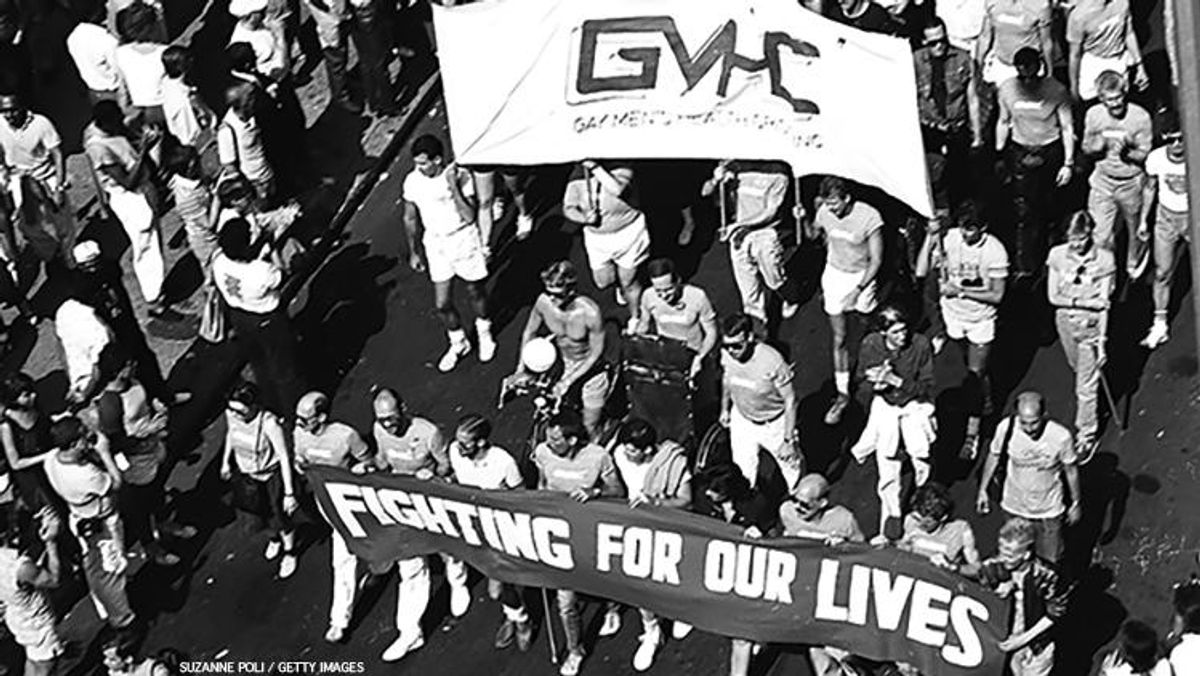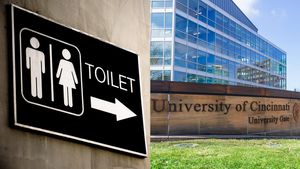The Gay Men’s Health Crisis, now just known as GMHC, is believed to be the first organization to address the HIV epidemic in New York City, when the first cases of a “mysterious new illness” among gay and bisexual men were first identified by health officials in 1981. Though, tragically, we lost countless lives to the virus back in those early days, there are also many others who persevered and survived through those dark times — and who now are aging along with organizations like GMHC.
These days, over half of people living with HIV in this U.S. are age 50 or over. And while the term “long-term survivor,” or LTS, used to mainly refer to people who were diagnosed before today’s highly effective antiretroviral medications emerged in the late ’90s, it’s now commonly used for folks who have been living with HIV for a decade or more. No matter how you slice it, there is a huge population of people in this country who are now growing older with HIV.

Spectators watch GMHC representatives carry banners on Fifth Avenue during a 1995 NYC Pride March
In order to better serve this growing group, GMHC launched the Terry Brenneis Long-Term Survivor Hub in 2018. The Hub’s purpose is to connect people to GMHC’s wide array of nationally recognized services that support the psychosocial and educational needs of adults aged 50 and older. GMHC is also one of the nation’s leading organizations conducting research on long-term survivors and people aging with HIV, with its National Resource Center on HIV & Aging.
In 2021, the Brenneis LTS Hub got a major boost when two generous donors, brothers David and Joshua Boger, committed to giving it $500,000 over a period of five years. David Boger, a long-term survivor of HIV himself, donated the funds in honor of his late partner. Because of this, the program was officially renamed the Terry Brenneis and David Boger Hub for Long-Term Survivors (or the Brenneis-Boger LTS Hub for short).
“My brother and I are thrilled to be able to provide GMHC with this new support to meet the growing needs of older adults and LTS,” said David Boger, a retired psychiatrist, when the donation was announced last year. “As a long-term survivor myself, I understand firsthand the challenges facing my community. The Hub will provide the intensive support that LTS and older adults need for building resilience and strengthening well-being.”

David Boger (above) gave a generous donation to GMHC, which is now helping other long-term survivors of HIV
“The Hub has been around since 2018,” says GMHC’s LTS peer support coordinator, Alejandro Santiago. “Originally it was basically designed as in-person [services] for New York City residents, with in-person workshops and support groups. Back then, we had the ability to have these wonderful seminars in person, they’d last a few days. And we’d offer a buddy lunch…. And then COVID made us change.”
Since isolation, and subsequent depression and substance issues, have long plagued the LTS community, Santiago says the latest pandemic, COVID-19, has unfortunately only compounded these issues for long-term survivors.
“One thing I have noticed the most,” he says, “as a long-term survivor myself — I’m 63 and was diagnosed in ’92 — is a deterioration of mental health because of our isolation, so that’s adding to our mental health issues. And that is adding to our substance abuse issues…. As someone in recovery myself also for 29 years, it is a very different approach to try to help somebody through Zoom than when you were able to go to 12-step type meetings, to an environment with personal contact. Very few [older clients] are open to sharing things through Zoom.”
Santiago explains that, in addition, the growing generation gap between long-term survivors and health care providers can also sometimes be an issue.
“As an older generation, it is harder to find someone in mental health — like a therapist or a psychiatrist — who at least was around in some of the ’80s and ’90s, that they could relate to. We have a lot of wonderful younger-generation therapists, however, sometimes it’s really hard to connect to them because they didn’t live through the experiences themselves…so I find that a lot of us are keeping ourselves from reaching out because we don’t connect.”

Alejandro Santiago, a peer support coordinator at GMHC, explains some of the special needs of people aging with HIV
Still, he says things are slowly improving. Through the Hub, GHMC staffers like Santiago do personal check-ins with each client, making sure they have everything they need. And he says many of the older clients have started to open up in virtual sessions, though it can take a little time for them to let their guards down.
“There’s a couple of clients I can think of who, from the very beginning, were silent. And now they’re like, ‘Hey, how are you, Alejandro? It’s good to see you!’ You notice that with some of them it’s taken them almost a year to get to that point. And to know each other in the group and say hi to each other on the Zoom call…. Many of us have the fear of connecting with people again because we don’t [want to] lose people again. That plays into it. And COVID has rekindled that feeling.”
“Of course,” he adds, “once they realize that whoever is in the room is also a long-term survivor or is over 50, they’re like, ‘OK, so we’re all the same here.’ People have started opening up now, and it’s really creating a good environment.”
Despite COVID challenges, the feedback on the Hub from the organization’s older clients living with HIV has continued to be mostly positive. “It’s like a lifeline,” says GMHC client Kim, in a promotional video for the program. “I’m still here and I am so proud.”
















































































